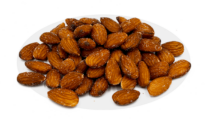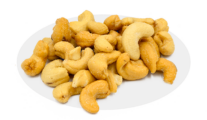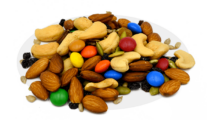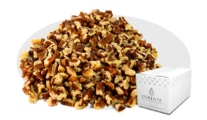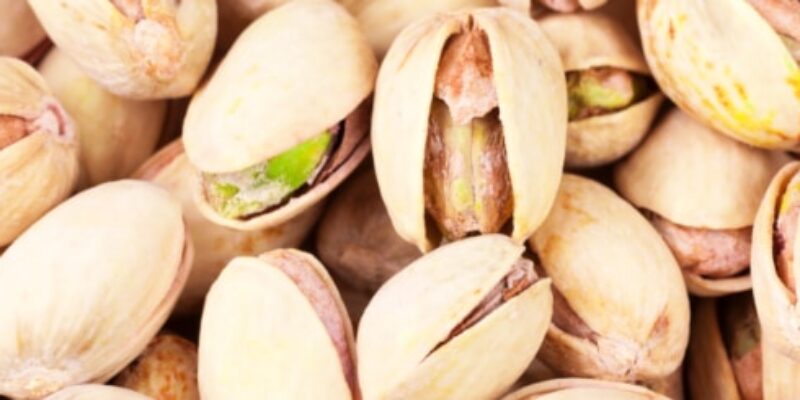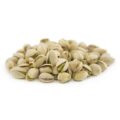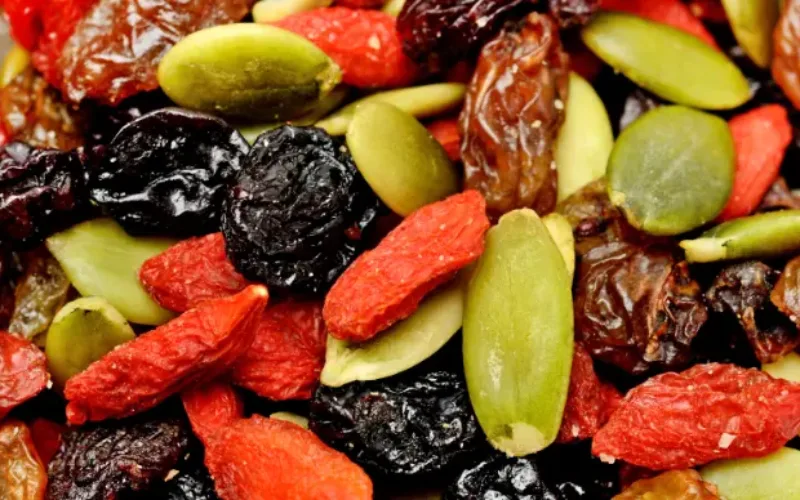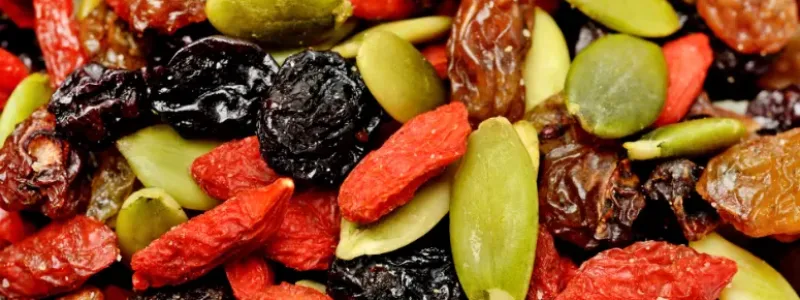Written By Sam Henselijn
Pistachios are the seeds of the pistachio tree, which originated in Western Asia. Archaeologists believe pistachios became a food staple of early humans as far back as 7,000 B.C., and that the pistachio’s high nutritional value and long storage life made it an indispensable travel item among early explorers and traders.
Pistachios are called nuts, but botanically, pistachios are seeds. The kernels have a color gradation ranging from yellow to shades of green. They’re usually about an inch long and half an inch in diameter. But if you want to taste one, you’ll have to crack open its hard shell first. A tightly closed shell around the kernel indicates the nut is not yet ripe. Ripe pistachios have an open shell. The nuts will stay fresh for up to a year if stored in the shell, but are best if eaten within four months of purchase.
Pistachio History
During the 1880s, imported pistachios gained popularity in the US, but demand was primarily from middle-eastern immigrants. The first attempts to develop pistachios as a home-grown crop date from the start of the last century, but until the 1940s, they continued to be imported mainly from Iran and Turkey. Commercial production began in the 1970s, and since that time, the United States has become a major grower and exporter of pistachios, with over 90% of our domestic crop grown in California. Worldwide, smaller quantities come from Italy, Greece, Turkey and Iran.
Pistachios are rich in beneficial nutrients. Consider these nutritional benefits of pistachios as an added perk to their particularly pleasant taste. The health benefits of pistachios may include a healthy heart, weight management, prevention of macular degeneration and hypertension, and improved digestion. It can also boost blood, brain, and skin health.
They have higher protein than cashews, macadamia nuts, pecans, walnuts, hazelnuts, and cashews. The fat content is also the lowest compared to the other nuts. The bottom line is that if you haven’t been eating pistachios, you need to start doing it right now.
There are many easy and tasty ways to enjoy the health benefits of pistachios. Eat them by the handful, raw or roasted, sprinkled over a salad, mixed with dried fruits in trail mix, in baked goods such as Baklava, as nut butter, or as a crunchy coating for fish or meat. Pistachio cooking oil will add a delicately sweet nutty flavor to your favorite recipes.
The Well-balanced Nutritional Benefits of Pistachios
Unlike many other nut and seed foods, pistachios contain a well-
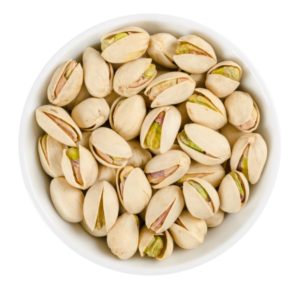
balanced complement of nutrients including carbohydrates, protein, amino acids, fats, and dietary fiber. This translates to the same great nutrition but at a lower calorie and fat content for the same amount consumed.
According to the USDA National Nutrient Database, pistachios are also rich in minerals such as phosphorus, potassium, calcium, iron, magnesium, zinc, copper, and selenium.
They also provide essential vitamins like the B-vitamins, vitamins A, C, E, and K, as well as choline and betaine. Pistachios have 6 grams of plant-based protein in one ounce. They also have 3 grams of fiber, which helps with digestion and appetite satisfaction, which is great for weight control.
What’s the best way to avoid eating too many at one sitting? one way to control your consumption of this delicious snack is to buy them in the shells instead of the pre-shelled variety: it takes longer to eat when you have to pry open the shells. The shells are a great visual reminder of how many nuts you’ve eaten.
Pistachio’s Health Benefits
Pistachios may bring down your risk of heart disease in several ways:
They can lower cholesterol and regulate blood pressure. There
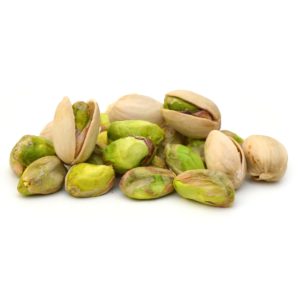
have been several studies proving that pistachios can decrease the levels of LDL (bad) cholesterol in the body, as well as lower blood pressure.
The antioxidants, phytosterols, and unsaturated fatty acids are also great for promoting a healthy heart. Pistachios have 13 grams of fat per serving, the majority of which (11.5 grams) comes from heart-healthy monounsaturated and polyunsaturated fats.
Pistachios are also a potent source of the amino acid l-arginine, which may prevent arteries’ hardening and blood clots’ formation.
May Aid in Weight Management
Pistachios are the perfect food for weight management with their lower calories, high protein, low saturated fat, and high unsaturated fats. Protein makes up 20% of the weight of pistachios, and they’re second in protein content only to almonds. They also have a higher concentration of amino acids than any other nut, and amino acids are the building blocks of protein. Bodybuilders should pick up pistachios instead of other nuts if they have to make a choice.
Pistachios are also chock full of fiber, and the combination of high protein and fiber keeps you full and satisfied long after eating.
One study showed that people who got 20% of their calories from pistachios lost more weight than a control group who did not eat any pistachios. In fact, nuts and seeds, in general, are good for people who are trying to lose weight.
Pistachios contain the carotenoid antioxidants lutein and
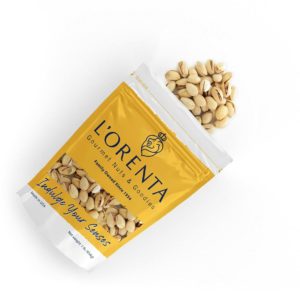
zeaxanthin. According to the American Optometric Association these antioxidants help in reducing the risk of contracting an age-related macular disease in the elderly as well as protection from Blue Light Damage.
We’re now all more exposed to blue light daily through our computers and electronic devices, including staring at our cell phones for hours on end.
May Aid in Digestion and Gut Health
Pistachios are a good source of dietary fiber, which aids in smooth digestion. The antioxidants and fiber also make pistachios a natural prebiotic that helps with bloating, regularity, and overall stomach health.
A high-fiber diet is often recommended as a part of a heart and immune-healthy diet. Eating pistachios has been shown to increase the number of butyrate-producing bacteria in the gut, which can help reduce the risk of digestive disorders and cancer, including colon cancer and heart disease.
May Aid in the Absorption of Iron
Pistachios have a high copper content, which enables higher absorption of iron into the body from food sources. This can help combat conditions like anemia, resulting in higher hemoglobin counts and increased blood flow.
May Aid in Skin Care
If you want healthier, clearer skin, you need to consume sufficient vitamin E. Pistachios more than meet this need. Vitamin E helps your skin in a number of ways. From protecting surface membranes from the effects of UV rays to enabling younger-looking skin.
Eating foods rich in vitamin E, antioxidants, and other protective nutrients is a great way to ensure you have healthy skin into old age, with fewer wrinkles and skin spots.
May Control Diabetes
People with diabetes can benefit from eating pistachios. The antioxidants present help in controlling blood sugar levels and blood pressure. According to a study cited in The Review of Diabetic Studies in 2014. According to this study, people suffering from diabetes who ate about an ounce of pistachios every day for three months had more stable glucose levels.
Potentially Anti-inflammatory
The presence of anti-inflammatory nutrients in pistachios, including vitamins A, E and K, means that incorporating pistachios in your diet helps reduce inflammation in almost any part of the body.
Potentially Neuroprotective
The high levels of vitamin B6 present in pistachios help to maintain a healthy nervous system by providing the building blocks for the amino acids essential for transmitting nerve impulses. This includes building myelin around nerve fibers, nerve cell communication, and nerve impulse transmission.
May Boost Immunity
Pistachios also boost immunity due to their rich source of vitamin B6. They aid in building a strong immune system and help in protecting the body against various infections. Pistachios also contain carotene and vitamin A, which help protect the body from infection and disease.
Emotional Well-being
Pistachios are a great source of Vitamin B6, which can be quite low in people with depression. It plays a role in energy production. It also helps the body make the brain chemicals (neurotransmitters), serotonin, and norepinephrine, which influence mood and melatonin. In turn, they help regulate the body’s internal sleep-wake clock.
Pistachios also contain minerals such as calcium, magnesium, potassium, selenium, and phosphorus. These are necessary for the production of hormones important to emotional well-being.
Ready for some Pistachios?
Don’t let another day go by without enjoying the great taste and health benefits of pistachios from L’Orenta’Nuts! It doesn’t get any better than our In-shell Whole Roasted Pistachios. With so many amazing health benefits, we’re sure you’ll go nuts for our pistachios!
How many pistachios should you eat a day?
The recommended daily intake of pistachios can vary based on individual dietary needs and overall health. As a general guideline, a serving of pistachios is typically about 1 ounce or 28 grams, roughly 49 pistachios. Consuming this amount can provide beneficial nutrients without excessive calorie intake. However, individual dietary requirements and health conditions vary, so it’s advisable to consult with a healthcare professional or a registered dietitian for personalized advice based on your unique circumstances.
Why are pistachios a Superfood?
Pistachios are often considered a superfood due to their impressive nutritional profile and potential health benefits. They offer:
Healthy Fats: Rich in monounsaturated and polyunsaturated fats, which are heart-healthy.
Protein: A good source of plant-based protein, aiding in muscle repair and overall body function.
Fiber: High fiber content supports digestion and helps maintain a healthy weight.
Antioxidants: Contains antioxidants like lutein and zeaxanthin, promoting eye health.
Nutrient Variety: Provides essential nutrients, including vitamins B6 and E, copper, manganese, and phosphorus.
Regular consumption of pistachios may contribute to heart health, weight management, and overall well-being, earning them the status of a superfood.
Sam Henselijn Author’s Biography – Meet L’Orenta Nuts CEO
Copyright 2024 L’Orenta Nuts
L’Orenta Nuts proudly holds the SQF food safety certification, symbolizing our unwavering dedication to upholding the highest standards of food safety and quality. This certification guarantees that our products undergo rigorous scrutiny, ensuring transparency, traceability, and adherence to global food safety regulations for the utmost consumer confidence.
L’Orenta Nuts has the HACCP (Hazard Analysis and Critical Control Points) certification is a systematic approach to identifying, evaluating, and controlling food safety hazards. It ensures that food products are produced and handled in a manner that minimizes risks and complies with safety standards.
Our GMP (Good Manufacturing Practices) certification ensures that a manufacturing facility adheres to comprehensive quality and safety standards while producing pharmaceuticals, food, and other consumer goods, promoting consistency, quality, and compliance with regulatory requirements.
L’Orenta is an FDA-approved manufacturing facility and has met the rigorous standards set by the U.S. Food and Drug Administration. It demonstrates compliance with regulations, ensuring the production of safe and high-quality food products.


